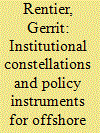| Srl | Item |
| 1 |
ID:
117240


|
|
|
|
|
| Publication |
2013.
|
| Summary/Abstract |
This paper provides an ex-post assessment of the climate and energy policy developments in Chile emerging from a neoliberal economic model, during the period 1971-2007. First, correlation and regression analyses were performed to analyse historical CO2 emissions as a product of demographic, economic and energy-wide drivers. Then I estimate indicators related to CO2 emissions, energy use and economic activity. In the light of empirical results, I identify policy instruments and structural issues. Finally, I present a comparative analysis of Chile and other Latin American countries. Statistical tests show that variability of CO2 emissions is explained mostly by GDP per capita ('affluence') than any other tested variable. Indicators show that the diversification and decarbonisation of the energy mix has been a major policy challenge. With two notable exceptions (hydro and natural gas), the CO2 intensity of the energy supply mix suggests no effective policies, while energy security crises triggered negative carbon effects and increased prices. No clear policies to promote energy efficiency can be identified until 2005. Explicit policy instruments to promote renewable energy are only recognised after 2004. The results strongly suggest that Chile lacked of policies to effectively decarbonise its energy-economy system.
|
|
|
|
|
|
|
|
|
|
|
|
|
|
|
|
| 2 |
ID:
166972


|
|
|
|
|
| Summary/Abstract |
This paper assesses the energy transition in Germany from 1990 to 2017 with a focus on the politics and energy policies of the three German Chancellors. Its aim is to investigate the factors underlying the outcomes from a socio-political perspective and through this offer insight as to energy policy reforms that may be transferrable to other governments. We reveal the incremental and politically pivotal role of grassroots movements against nuclear power forming the catalyst and ongoing driver for Germany's energy transition - the Energiewende. Energiewende harbors a compelling socio-technical experiment based on government-led policy-driven structural changes to the energy system that has concurrently supported a heavily industrialized economy. Despite higher energy costs, borne disproportionally by residents, the energy vision and social experiment shared decadal and multi government cross-partisan political and community support. This socio-political policy stability provides a notable point of difference when comparing the energy transitions of lagging nations such as Australia that reveals the criticality of policy certainty to support investment towards new models of clean energy generation and distribution.
|
|
|
|
|
|
|
|
|
|
|
|
|
|
|
|
| 3 |
ID:
191168


|
|
|
|
|
| Summary/Abstract |
This paper analyses how institutional constellations and their associated mode of risk allocation are reflected in the choice of policy instruments for the promotion of offshore wind power. Using the Varieties of Capitalism framework we expect that governments in Liberal Market Economies (LME) tend to use policy instruments that privatise investments and risk-taking, while those in Coordinated Market Economies (CME) use policy instruments that facilitate investments and shared risk-taking in the earlier, more riskful phase of technological development. We test our expectations through a longitudinal comparative analysis of the use of policy instruments and the deployment of offshore wind power in Denmark, the United Kingdom, Germany and the Netherlands between 1990 and 2020.
|
|
|
|
|
|
|
|
|
|
|
|
|
|
|
|
| 4 |
ID:
125669


|
|
|
|
|
| Publication |
2013.
|
| Summary/Abstract |
Using the latest available data, this brief article attempts to provide the first regional decomposition analysis of CO2 emissions from fuel combustion. Covering eight regions of the world, determinants are estimated in relative and absolute terms for the period 1971-2010. We use the unparalleled 2010 global surge in CO2 emissions as a reference and entry point for the analysis. Overall, results show that most regions have recently performed worse than their historical trends and lack of meaningful progress is identified. Whereas specific drivers for certain regions suggest some level of continuous improvement (e.g. reduced energy intensity in Asia, decarbonisation of of energy supply in OECD Europe), they are incapable of offsetting the effects of economic growth and increased energy use. With the exception of Africa, most regions appear to have missed the 'low-carbon economy opportunity' provided by the 2008-2009 global financial crisis. Results suggest a lack of serious environmental effectiveness of regional policy portfolios aiming at reducing CO2 emissions. Highly ambitious energy efficiency and renewable energy policies across all regions are immediately needed. Additionally, absolute reductions in energy use from fossil fuels and resulting CO2 emissions are urgently required in rich regions if we are to align production and consumption patterns with maintaining global warming below the 2 °C threshold.
|
|
|
|
|
|
|
|
|
|
|
|
|
|
|
|
| 5 |
ID:
177129


|
|
|
|
|
| Summary/Abstract |
The tools available to translate climate targets into abatement actions are mainly based on costs and technical feasibility. Options for greenhouse gas abatement span all sectors, all countries, and involve a huge variety of technologies. The reasons for abatement to be realized, or not, are diverse and complex. In particular, the political discussion why many affordable options do not materialize is naïve and ad hoc. Here we show the Y factor, an approach for a quick scan of abatement options against a set of prominent abatement barriers. We define 12 factors which capture a broad set of barriers related to 1) costs and financing, 2) multi-actor complexity, 3) physical interdependencies and 4) behaviour. We rank 24 abatement options using an explicit, but coarse scoring for these barriers. We show that all abatement options have implementation barriers, many of which may well drastically impact their implementation beyond what would be expected from their abatement costs. The analysis implies that the relation between abatement costs and the barriers withholding implementation is not straightforward and calls for a deliberate policy debate on prioritization and policy intervention. The Y factor structures such a policy debate.
|
|
|
|
|
|
|
|
|
|
|
|
|
|
|
|